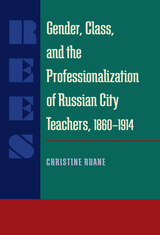3 start with G start with G

Ruane's research and insightful analysis broadens our knowledge of an emerging professional class, especially newly educated and emancipated women, during Russia's transition to a more modern society.

How can exploitation and even class division occur in socialist societies? The question is not merely embarrassing for Marxists and socialists. It is also a deep puzzle for economic theorists. In this original and powerful work, John Roemer proposes a general theory of exploitation which provides a game theoretic framework for expressing any conception of exploitation—feudal, capitalist, or socialist—in a standardized and explicit way, thus permitting a clear comparison of different ethical conceptions. As well as applying the general theory to an analysis of socialist society, Roemer uses it to contrast Marxian and neoclassical conceptions of exploitation. By placing the Marxian conception of exploitation in the context of a more general theory, Roemer provides fresh insights into classical questions, and resolves several old problems in Marxian economics.
The book also contains a formal theory of class formation. Once the behavior and institutional specifications of an economy are given, classes emerge endogenously in the model. In a major theorem Roemer relates the two key characteristics of a person in a given economy: his class position and his status as exploiter or exploited. Finally, he shows that the general theory of exploitation can be viewed as the formal translation into economic language of the theory of historical materialism. In its mathematical power and precision, its skillful use of general equilibrium and game theory, the book will become an important bridge between Marxist and neoclassical economics.

William I. Robinson, University of California-Santa Barbara
"[An] acute and revealing examination of the economic difficulties facing the American empire."
Ronnie D. Lipschutz, Professor of Politics, University of California, Santa Cruz
"Indispensable for students of international polical economy and a must for political activists." Professor Elmar Altvater, Department of Political Science, Free University, Berlin
Like many buzzwords, 'global governance' is as poorly understood as it is popular. In contrast to most mainstream accounts, this book examines global economic governance as an integral moment of contemporary capitalism -- presenting a critical insight into its real nature and the interests that it serves.
This book begins by asking what has not been discussed in the mainstream debates and why. Drawing on a Marxist perspective, Soederberg explores neglected issues including transnational debt and the increasingly coercive nature of US aid to so-called Œfailed states'. Soederberg argues that mainstream understandings fail to engage with the wider contradictions that characterise global capitalism. In consequence, there is no explanation of the changing nature of American empire and capitalist power in the world. Furthermore, Soederberg argues that global governance acts to normalise and legitimise increasingly austere forms of capitalist expansion, which may be regarded as a deepening and broadening of neoliberalism.
Susanne Soederberg is a Canada Research Chair in Global Political Economy and Associate Professor in International Development Studies at Queen's University, Kingston, Canada. She is author of The Politics of the New International Financial Architecture: Reimposing Neoliberal Domination in the Global South (Zed, 2005).
READERS
Browse our collection.
PUBLISHERS
See BiblioVault's publisher services.
STUDENT SERVICES
Files for college accessibility offices.
UChicago Accessibility Resources
home | accessibility | search | about | contact us
BiblioVault ® 2001 - 2024
The University of Chicago Press









